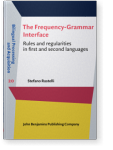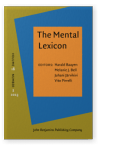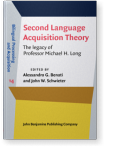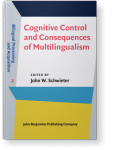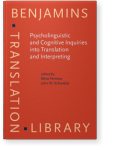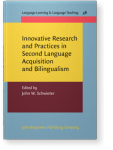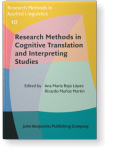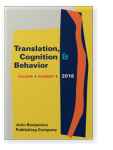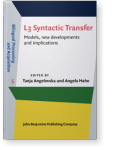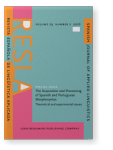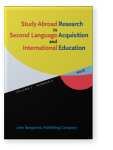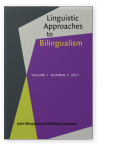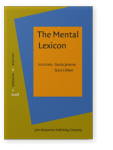John W. Schwieter
List of John Benjamins publications for which John W. Schwieter plays a role.
Book series
Journal
The Mental Lexicon (ML)
Edited by Harald Baayen, Melanie J. Bell, Juhani Järvikivi and Vito Pirrelli
ISSN 1871-1340 | E-ISSN 1871-1375
Second Language Acquisition Theory: The legacy of Professor Michael H. Long
Edited by Alessandro G. Benati and John W. Schwieter
[Bilingual Processing and Acquisition, 14] 2022. xxiv, 276 pp.
Subjects Language acquisition | Multilingualism | Theoretical linguistics
Cognitive Control and Consequences of Multilingualism
Edited by John W. Schwieter
[Bilingual Processing and Acquisition, 2] 2016. xvii, 453 pp.
Subjects Cognition and language | Multilingualism | Psycholinguistics | Theoretical linguistics
Psycholinguistic and Cognitive Inquiries into Translation and Interpreting
Edited by Aline Ferreira and John W. Schwieter
[Benjamins Translation Library, 115] 2015. vii, 206 pp.
Subjects Cognition and language | Cognitive psychology | Interpreting | Translation Studies
Innovative Research and Practices in Second Language Acquisition and Bilingualism
Edited by John W. Schwieter
[Language Learning & Language Teaching, 38] 2013. xiii, 335 pp.
Subjects Applied linguistics | Language acquisition | Language teaching | Multilingualism
2025 Chapter 4. Cued retrospection Research Methods in Cognitive Translation and Interpreting Studies, Rojo López, Ana María and Ricardo Muñoz Martín (eds.), pp. 92–107 | Chapter
This chapter describes the method of cued retrospection and how to implement it into research designs. Cued retrospection orginated in psychology and has been used in interpreting studies since the mid 1990s. It is a method based on the participants’ own recollection of the processes of tasks… read more
2022 Chapter 1. The legacy of Professor Michael H. Long and his influence in second language acquisition Second Language Acquisition Theory: The legacy of Professor Michael H. Long, Benati, Alessandro G. and John W. Schwieter (eds.), pp. 1–8 | Chapter
This chapter will provide a brief overview of the influence of Professor Michael H. Long in the field of second language acquisition whose work has shaped our understanding of many key concepts in the field. The chapter continues with a short synopsis of the contributions in this volume… read more
2018 Decision-making processes in direct and inverse translation through retrospective protocols Translation, Cognition & Behavior 1:1, pp. 98–118 | Article
Metacognitive aspects of decision-making processes were investigated in eight professional translators who translated related and unrelated texts from L2 English into L1 Portuguese and also from L1 into L2. Retrospective protocols were recorded after each translation task. Verbal utterances were… read more
2017 Chapter 11. Input Processing and Processing Instruction: Pedagogical and cognitive considerations for L3 acquisition L3 Syntactic Transfer: Models, new developments and implications, Angelovska, Tanja and Angela Hahn (eds.), pp. 253–275 | Chapter
Input Processing refers to the initial process by which learners connect grammatical forms with their meanings as well as how they interpret the roles of nouns in relationship to verbs. The pedagogical intervention derived from this theoretical framework, Processing Instruction (PI), has… read more
2016 Reading comprehension: The role of acculturation, language dominance, and socioeconomic status in cross-linguistic relations The Acquisition and Processing of Spanish and Portuguese Morphosyntax: Theoretical and experimental issues, Klassen, Rachel, Anahí Alba de la Fuente, Joanne Markle LaMontagne and Almudena Basanta y Romero-Valdespino (eds.), pp. 613–639 | Article
The role of first language (L1) skills in second language (L2) achievement is often investigated to assist learners in acquiring their L2. There are several factors that may influence potential relations among Spanish and English measures (e.g., age of L2 acquisition, social status, among others).… read more
2016 Chapter 8. Effects of cognitive control, lexical robustness, and frequency of codeswitching on language switching Cognitive Control and Consequences of Multilingualism, Schwieter, John W. (ed.), pp. 193–216 | Article
This study explores the effects of individual differences on the production of words when switching between a strong and significantly weaker language. Variables of interest included non-linguistic cognitive control, lexical robustness (i.e., the size and strength of the lexicon), and frequency of… read more
2016 Cognitive and neurocognitive implications of language control and multilingualism Cognitive Control and Consequences of Multilingualism, Schwieter, John W. (ed.), pp. 3–8 | Article
This section presents introductory remarks and important issues at the forefront of studying the cognitive control of multiple languages. These themes are subsequently elaborated on and tested in the following chapters which present original empirical data and/or explore new directions and… read more
2016 Linguistic advances and learning strategies in a short-term study abroad experience Study Abroad Research in Second Language Acquisition and International Education 1:2, pp. 217–247 | Article
This study investigates lexical and morpho-syntactic development in comprehension and production among university-level students who participated in a second language (L2) study abroad program. Prior to and at the conclusion of the short-term study abroad experience, English language learners of… read more
2015 The position of psycholinguistic and cognitive science in translation and interpreting: An introduction Psycholinguistic and Cognitive Inquiries into Translation and Interpreting, Ferreira, Aline and John W. Schwieter (eds.), pp. 3–16 | Article
2013 Chapter 11. Language selection, control,
and conceptual-lexical development
in bilinguals and multilinguals Innovative Research and Practices in Second Language Acquisition and Bilingualism, Schwieter, John W. (ed.), pp. 241–266 | Article
This chapter presents recent developments in the cognitive underpinnings of bilingual speech production. Upon close observation of the theories explaining how speakers of non-native languages are able to select the language in which to speak and control cross-linguistic interference from non-target… read more
2013 Preface Innovative Research and Practices in Second Language Acquisition and Bilingualism, Schwieter, John W. (ed.), pp. xi–xiv | Preface
2011
This study tests whether or not trilingual language learners rely on inhibitory control (IC) when accessing words during speech production. In particular, it investigates the extent to which second language (L2) and third language (L3) lexical robustness modulates such reliance. English language… read more
2008 Language switching in bilingual speech production: In search of the language-specific selection mechanism The Mental Lexicon 3:2, pp. 214–238 | Article
Recent research on language production suggests that bilinguals shift from using inhibitory control mechanisms to a language-specific selective mechanism during development (Costa, Santesteban, & Ivanova, 2006). Costa et al. argue that the robustness of the L2 lexical representations may be… read more
